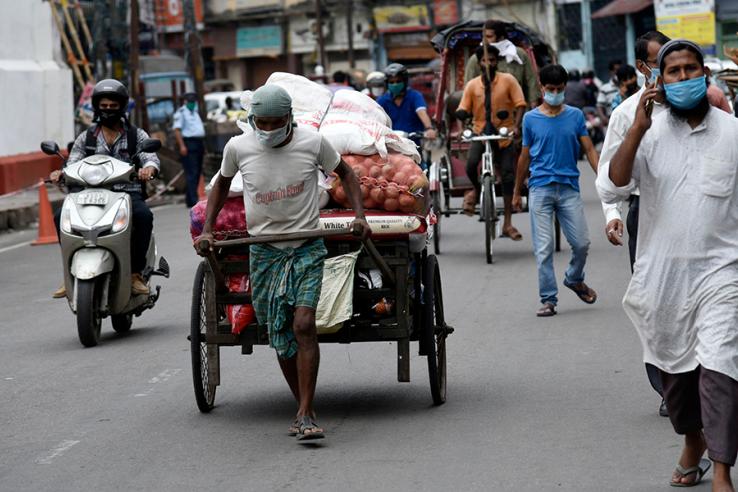May 2020 Newsletter

Expanding social protection amid the COVID-19 crisis
The loss of income from lockdowns, business closures, and other responses to control the spread of COVID-19 threatens the survival of many low-income households and businesses. In a piece distributed by Project Syndicate, J-PAL Southeast Asia Scientific Directors Rema Hanna (Harvard) and Benjamin A. Olken (MIT; Director, J-PAL) discuss why expanding social protection programs should be a pillar of every country’s response to COVID-19. They outline how existing research and past experience on targeted assistance and digital platforms can inform the design of programs that reach those most in need. Read more »
Evidence from Indonesia: Designing effective social programs
Over the past two decades, Indonesia has gradually shifted its poverty alleviation strategy from subsidizing basic commodities, such as food and electricity, to targeted assistance programs. Staff from J-PAL Southeast Asia highlight several lessons from the global evidence base for tackling challenges to targeting, designing, and implementing these types of programs. Read more »
Toward evidence-informed climate policy: A reflection on Earth Day
COVID-19 has shown how our interconnectedness can create unprecedented threats that affect us all. Climate change is one such example that will disproportionately impact people living in poverty. To honor the 50th anniversary of Earth Day on April 22, staff from the Environment, Energy, & Climate Change sector shared how they’ve been thinking about the need for evidence-informed action at the nexus of climate change and poverty alleviation. Read more »
Featured Evaluation
Leveraging insights from past health crises to strengthen responses to COVID-19
If people perceive the quality of health care to be low, they may be less likely to use health systems. J-PAL affiliated professor Oeindrila Dube (University of Chicago; Co-Chair, Crime, Violence, & Conflict sector) and co-authors tested the effect of two accountability tools on participants’ trust in the health care system and health outcomes in Sierra Leone. They found these strategies increased reporting of cases and reduced mortality during the 2014-2015 Ebola outbreak. Read the summary »
Featured Policy Insight
Teaching business skills to microentrepreneurs
Business skills training programs are common across the world, but do they actually help microentrepreneurs in low- and middle-income countries start and sustain a business? A review of 22 randomized evaluations shows that while being offered training improved business practices, it rarely increased profits. Alternative programs have shown promising results. Read more »
Featured Multimedia
Video: Scaling up individualized tutoring to improve learning in the United States
After partnering with J-PAL affiliated professors to evaluate their individualized math tutoring program, Saga Education expanded its program to reach over 2,500 students. Co-founder Antonio Gutierrez shares how understanding the impact of their program in Chicago helped secure buy-in from stakeholders to scale up the program and serve more students across the United States. Watch now »
Featured Webinar
Applying lessons from health evidence to design COVID-19 response programs
Existing health evidence on cash transfers, pricing, and trust in health systems could help governments improve adherence to guidelines for controlling the spread of COVID-19. In a recent webinar for the World Bank, J-PAL’s Health sector Co-Chairs Pascaline Dupas (Stanford) and Karen Macours (Paris School of Economics) shared how lessons from past research can be incorporated into program design to improve adherence and service delivery. Watch now »
Upcoming Events
June 1: Measuring women’s agency, empowerment, and norms in impact evaluations
What does it mean for women to have agency? Can women’s empowerment be measured? How can we know if social norms have changed? Tune in on June 1 to hear J-PAL South Asia’s Director of Policy, Training, and Communications, Shagun Sabarwal, discuss strategies for measuring gender outcomes that often seem difficult to capture through quantitative and qualitative indicators. Learn more and register »
Upcoming Courses
Evaluating Social Programs: Online course and webinar series
We are excited to bring you two easy ways to access J-PAL’s Evaluating Social Programs course from wherever you are.
J-PAL 101x, our online course, began on April 28, but it’s not too late to enroll! This free, self-paced course features lectures from renowned MIT faculty and J-PAL affiliated professors on how to use randomized evaluations to rigorously measure the impact of social programs. Learn more and register for J-PAL 101x »
From June 8-12, we will also be offering a free, week-long webinar training series. The interactive sessions will combine lectures from J-PAL affiliated professors and senior J-PAL staff with breakout sessions on case studies. Learn more and register for the webinar series »
June 2: MicroMasters’ summer semester begins
The next semester of our online Master’s in Data, Economics, and Development Policy (DEDP) begins June 2. Through a series of five online courses and in-person exams, learners will gain a strong foundation in microeconomics, development economics, and probability and statistics, while engaging with cutting-edge field research. Students who complete the full DEDP credential are eligible to apply for the Master's program in DEDP at MIT. Learn more and register »
MEDIA HIGHLIGHTS
Coronavirus is a crisis for the developing world, but here's why it needn't be a catastrophe (Opinion)
The Guardian
Prejudices about online courses, but healthy to lose some of those: Abhijit Banerjee
The Indian Express
The cleanest Earth Day ever?
CEGA Blog
A healthy understanding
MIT Technology Review
How data governments already have can guide the pandemic response (Opinion)
Governing
NEW RESEARCH PAPERS
Experimental Evidence on the Economics of Rural Electrification
Kenneth Lee, Edward Miguel, Catherine Wolfram
Eliciting and Utilizing Willingness to Pay: Evidence from Field Trials in Northern Ghana
James Berry, Greg Fischer, Raymond Guiteras
Public Information is an Incentive for Politicians: Experimental Evidence from Delhi Elections
Abhijit Banerjee, Nils T. Enevoldsen, Rohini Pande, Michael Walton
Does EdTech Substitute for Traditional Learning? Experimental Evidence of the Educational Production Function
Eric Bettinger, Robert Fairlie, Anastasia Kapuza, Elena Kardanova, Prashant Loyalka, Andrey Zakharov